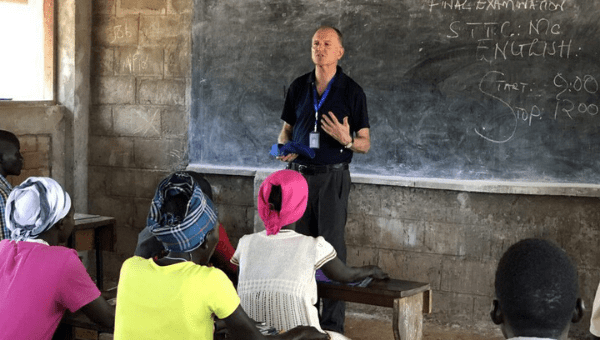
Response from JRS Director, Thomas Smolich SJ
“The COVID-19 lockdown here in Italy continues and it is uncertain when the isolating consequences of this pandemic will cease. The threat to our world remains serious, and especially to the most vulnerable in it. What happens next is still unknown, and JRS is doing its best to prepare.
2020 marks the 40th anniversary of the founding of JRS, which Fr Arrupe said was to offer “human, pedagogical, and spiritual service” to forcibly displaced people. In the face of current challenges, we draw strength from our long experience and are responding in three ways.
Our mission will not change: we will continue to accompany, serve, and advocate for and with forcibly displaced people in the world. This reality is requiring modifications in activities, new modes of walking with refugees, challenges to planning and budgeting. Thanks to staff willing to remain, most of our programmes are operating in reduced mode. Where possible, we continue to offer psychosocial support and to prepare for outbreaks of COVID-19. We are continuing feeding programmes, maintaining shelters for vulnerable women and children, adding emergency services in camps and urban areas, and providing COVID-19-related teaching materials for our educational activities. We will continue to walk with ourforcibly displaced sisters and brothers as well as we can.
Our preparedness is global: we have established a COVID-19 Response Team (CCRT) made up of JRS leadership from around the world. The team is sharing updates and experiences, and provides a coordinated response in this changing moment. Our offices are working remotely as much as possible, and we are supporting our staff in this rapid transition.
We will need your continued partnership: the full force of COVID-19 has not yet arrived in many of the places we work. Yet it is in Greece and Lebanon, and it is growing to Syria, Myanmar, and DR Congo, to name a few. We are assessing its current and potential impact on those we accompany, and how the nearly global shutdown of countries is affecting the programmes we had planned to implement this year with your help. Our offices are and will be in touch to discuss nextsteps with you and how your support can best be implemented to address the impact of the pandemic.
JRS Lebanon harnesses WhatsApp for social care
JRS MENA faces considerable challenges throughout the region. In Lebanon, lockdown restrictions are in place until April 26th and all staff are working remotely. To date [15th April] 658 people have been diagnosed with Covid-19 and 21 people have died. The JRS team is adapting to the changed work environment and has come up with some innovative solutions to work with the refugee population.
Home visits are not allowed, but JRS staff members phone each family they work with, daily. WhatsApp is being used for group distance learning for children and is also used by adult English and Arabic language classes, to keep in contact while isolating. Psychosocial support groups are held weekly on WhatsApp and social workers distribute information and videos about Covid-19 and mental health issues associated with isolation via the service. JRS also distributes emergency medical supplies, adhering to safety guidelines. Irish Jesuit Missions is supporting them by facilitating funding for hygiene kits which include essentials like soap and sanitiser, to help to mitigate Covid-19’s spread among this most vulnerable population.
JRS South Sudan uses radio and supplies PPE
Irish Jesuit Missions is supporting the staff and community outreach workers of the Jesuit Refugee Service (JRS) in Yambio by facilitating funding for personal protective equipment – including face masks, hand sanitiser and surgical gloves – to enable them to work safely with the community. Funding is also being supplied for core relief items such as soap to help refugees to protect themselves from infection.
As community engagement with social distancing and hygiene practices form such a vital part of stopping the spread of the virus, JRS is also running a series of radio programmes to inform people about the risks and to hear about their experiences. Community radio plays an important role in educating people about disease and was critical in some African countries to deal with the HIV/AIDS crisis.
JRS Kenya prepares for Covid-19 in Kakuma Refugee Camp
Irish Jesuit Missions has approved funding for JRS Kenya to implement their Covid-19 Emergency Response in Kakuma Refugee Camp. The camp, which was established in 1992, is located in the northwestern region of Kenya and is home to more than 190,000 people from South Sudan, Ethiopia and Somalia, making it one of the largest refugee camps in the world. Full story here
For more information about how JRS is responding to Covid-19 globally click here

